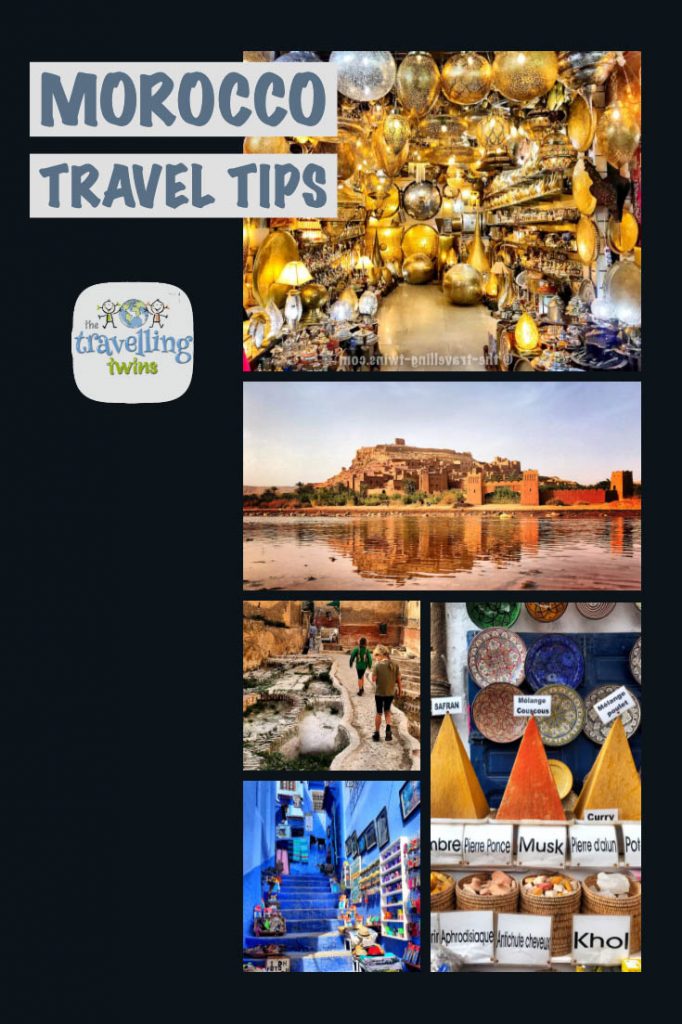
Planning a trip to Morocco? Don’t know what to expect? Then read on. I wish I had read a post with Morocco travel tips before we came here, it would have saved me a bit of time, money and heartache.
Arrival and Departure
Arrival by Air
When you arrive as a foreigner, you have to fill in and submit a form. With a bit of luck, your airline will give you one on the plane, but otherwise, you can pick one up in the airport arrivals area. I always remember too late that I don’t have a pen on me and run around sheepishly trying to borrow one, so first tip is to keep a ballpoint on you. (Fountain pens don’t seem to like air travel, I think it’s the pressure, but sometimes I have found them flooded on landing)
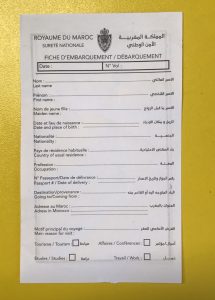
It’s worth noting that the border guards in Morocco do seem to read these forms and will perhaps ask questions, so unlike some other countries, it is worth taking time to write proper answers rather than make up whatever you think will get you through. For example I put “photographer” as my profession. It’s true but it seemed to raise more questions than it answered.
Other things we learnt the hard way:
Don’t expect to find a telephone company selling SIM cards in the lobby. If you want one (see below), then buy one from the first vendor you see.
Moroccan Airports tend to have security guards at the entrance doors so ask if your children/husband need the toilet before you leave the terminal, it might be time-consuming to come back inside again after you are outside.
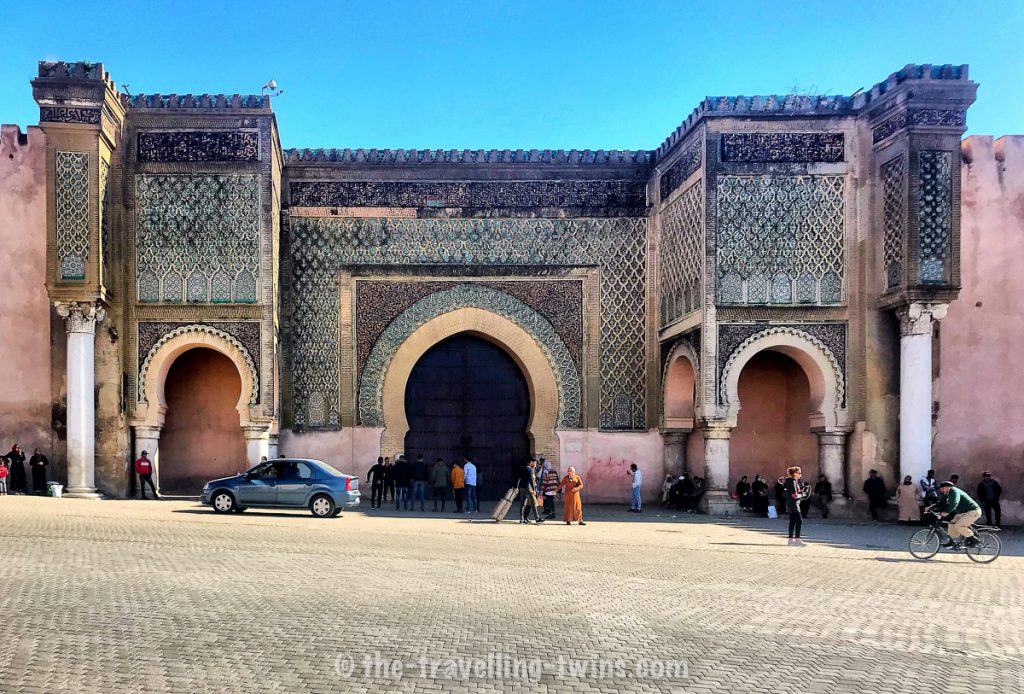
Read the fascinating story of how north Africa plundered the Mediterranean for slave labour – Including for the construction of Meknes: Morocco’s answer to Versailles
Departure by Air
Again you need a form. In some airports these are available from dispensers as soon as you enter the airport, so don’t wait until you are in a queue to pick up a form and realise you have to borrow a pen.
The check-in desk puts a mark on your ticket, so even if you have checked-in online and have only hand baggage, you STILL have to go to the check-in desk – or you will be sent back there by the border guard for failing to get the stamp on your ticket.
Is Morocco Safe to Travel with Children?
Yes, it is. We are travelling now both as a family of four and also when Nick is not with us as three (woman with two nine-year-olds) I have been warned to be careful with the girls as they are blonde and they draw lots of attention. So we have briefed the girls to keep close – either holding hands with us, or in our line of vision at all times, but to tell the truth, I have never felt any danger, no dirty looks, or people getting too close to them. All seems to be as safe here as anywhere else in Europe.
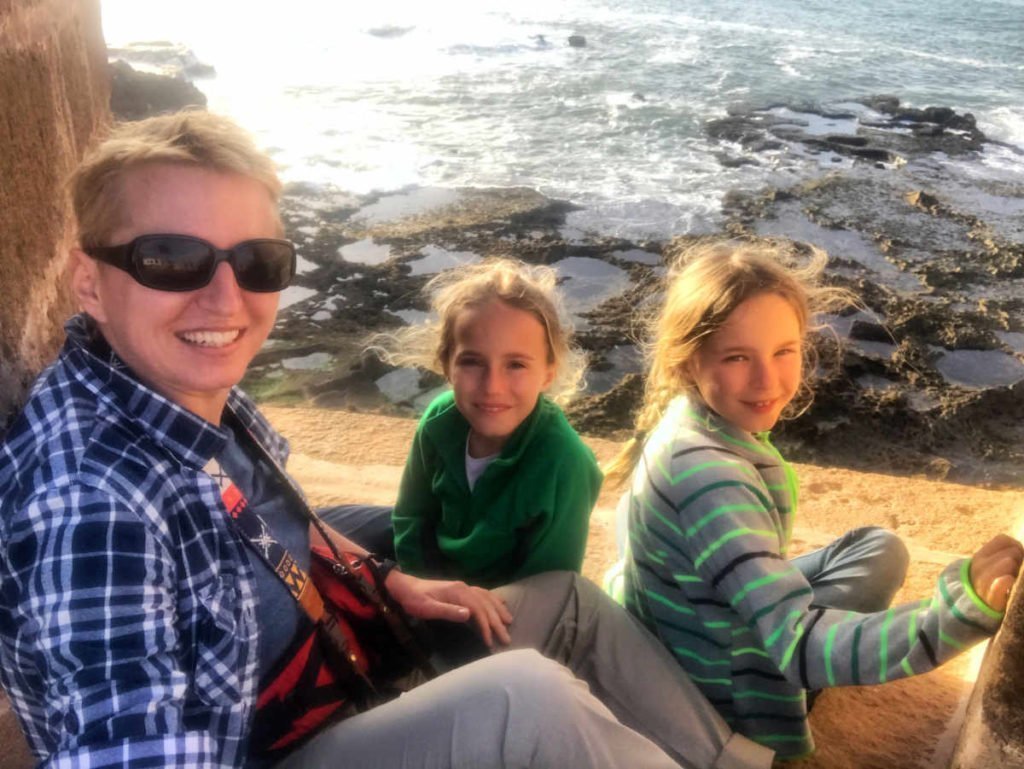
The only place where I would suggest being extra alert is Marrakech, and especially Marrakech Souq which is very crowded and easy for anyone to get lost. Even a few metres is enough to lose sight of someone or to take a wrong turn. There, I would suggest holding your child’s hand firmly all the time.
Our standard protocol which we remind the kids before every sortie is this: If you lose us, stop moving and stay still – we will come back and fetch you. Do not believe anyone who says they have a message from us. If someone does force you to go with them go ballistic and raise hell. Try to get help from another woman (ie not one who is taking you).
Other standard advice for Marrakech Souq for anyone of all ages is to be aware of pickpockets and watch out for motorbikes.
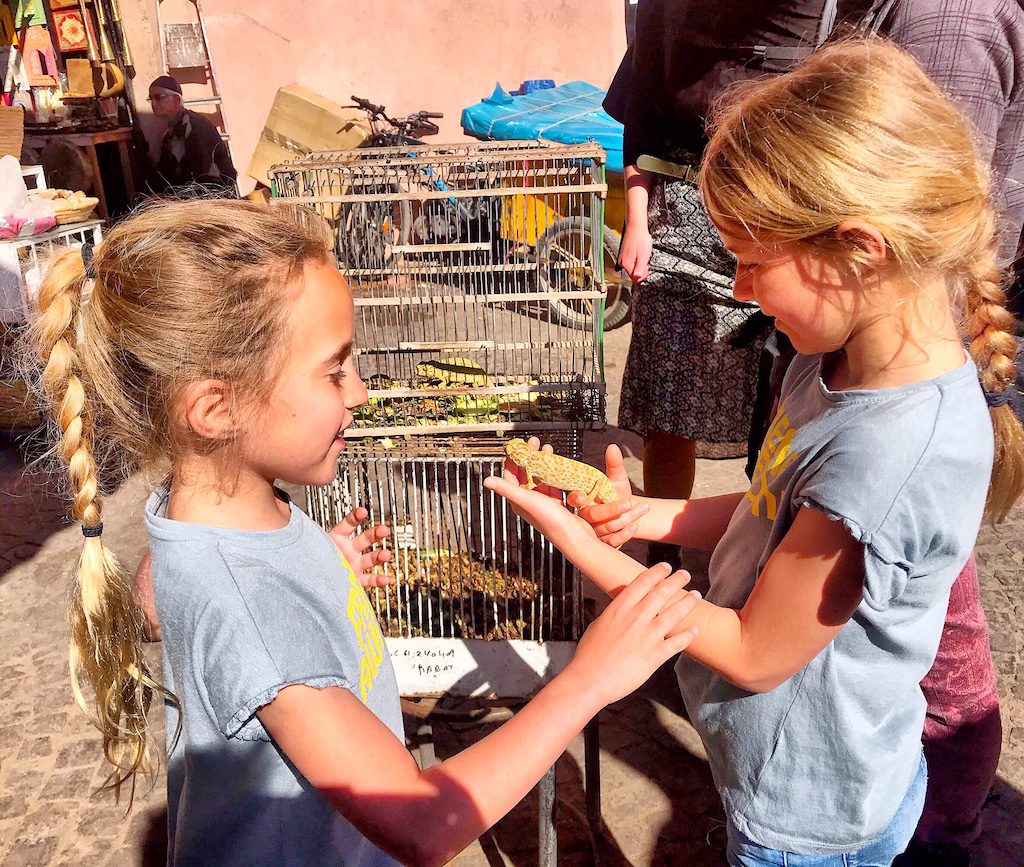
Marrakech with kids – read our guide
Having said that, Moroccan drivers on the streets of Marrakech and elsewhere DO respect pedestrians on zebra crossings, even to the point of stopping before you get onto the crossing and waving you across in front of them.
Language in Morocco
There are two official languages in Morocco – Arabic and Berber (facts about Morocco) French is compulsory in schools, so most people speak basic French unless you are in a small village like Imsouane. Note for English speakers – Merci, when you are offered something, means “no thanks.” not “yes thanks.”
In places with a tourist market, the vendors speak enough English to make the sale. And in Marrakech Souq they seem to speak all the languages of the world including Polish.
Nick says the nice thing about Moroccans is that they don’t laugh at his French as French people do.
Money in Morocco
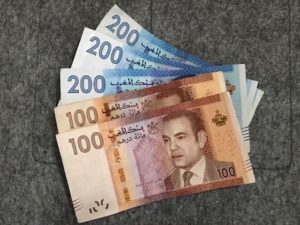
Currency is Moroccan Dirham (officially MAD but commonly Dhs) 10 dirhams is about $1US or €0,90 or £0,80
Morocco is a cash place. Don’t expect to be able to pay by card except in international chains.
Best Morocco Travel tip regarding money is always to have loose change with you, especially in Marrakesh, where you can get harassed by beggars. Trust me: it’s easier to give them a few dirhams to get rid of them. Why so little? because a few meters farther on you will meet a half-blind old lady also asking for money, and so save your bigger change for her because otherwise you just gave it away to someone only because he was more pushy.
Some ATMs also are change machines, and some don’t seem to have any money to give away at all, so don’t leave it until the last minute before looking for an ATM.
ATMs make a small fixed charge so its most economical to get out the maximum – which seems to be 2,000 dirhams.
General advice for any foreign country when paying by card applies here: If ever you are offered the option of being charged in local or home currency always opt for local currency, your bank will almost certainly give you a better exchange rate than the foreign (to you) country vendor.
Power Sockets in Morocco
Morocco uses 220v standard European round pin power sockets. If you are from North or South America (or anywhere else in 110v – land) check that your equipment will work at 220v. If from anywhere else, you just need the European round-pin plug adaptor.
For some reason, electric lights in Morocco are always connected to the untidiest cables we have seen anywhere. I think you take your life in your hands if you touch any lighting fittings.
SIM cards and Internet in Morocco
As we checked almost all accommodation comes with wifi internet, but 4G mobile internet is cheap and widely available. Random people sell SIM cards. We couldn’t find an official vendor anywhere. Data rates are reasonable (1GB = 10 Dhs) so if you want a SIM card buy one from the first person who offers you one. A SIM card costs 30Dhs and it comes with some phone credit but to be able to use it for internet you need to add credit. Look for signs saying “Recharge”
Travelling About Within Morocco
Donkeys and donkeys carts are a common way of transport. We didn’t use them, so I cannot write anything about their comfort, but we used other transportation.
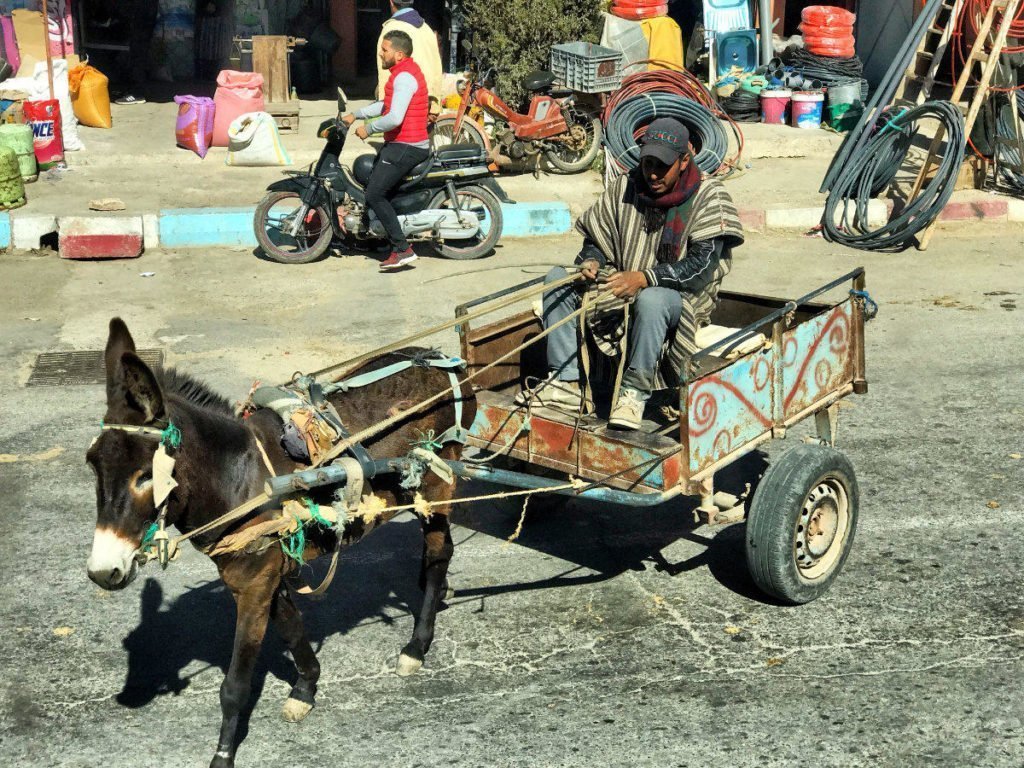
Travelling by bus in Morocco
You can either choose an ultra cheap Local bus company with tickets probably costing maybe 60 Dhs ($6) for a typical three hour trip (Agadir to Marrakesh), or else you can go with a more upmarket company and add a few dollars more for a better ride with a/c (eg Marrakesh to Ouarzazate by CTM cost us 90 Dhs per seat plus 5 Dhs for each piece of hold-luggage)
Here is what you need to know if you use cheaper buses
Be aware of luggage handlers and helpers – they will adopt you and your baggage like old friends, even if you don’t need help, and then they require to be paid.
Don’t be surprised that the local bus won’t have a/c, so it’s good to sit halfway back where there will be some ventilation
Keep your ticket handy – they seem to check them several times on a long journey
A long journey will often have a ten minute stop every couple of hours so you can get out and buy orange juice or find a toilet.
Luggage is extra. 5 or 10 Dhs a piece. It goes in the hold so don’t leave valuables in it (though we have never lost anything)
Local Buses generally run from the main bus station (Gare Routière).
Better companies. For example either CTM and Supratours have their own separate bus stops, often away from regular bus terminals, even if their ticket office is within the Gare Routiere – so check where they depart from when buying your ticket!
You can book a CTM ticket on the internet and pick it up at the bus station before the trip.
Travelling by Taxi in Morocco
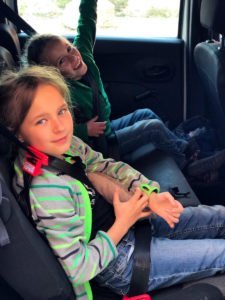
There are two kinds of taxi in Morocco – Petit and Grand. Petit can go locally only and can only take three passengers including children. Grand taxis take you between cities or inside the town, and they can take more than 3 passengers.
Your taxi driver will use his phone while he is driving. You can close your eyes if you want, but you can’t stop him using his phone.
Most taxis don’t have a meter so agree the fee before entering – feel free to haggle.
If you are travelling between towns, download the relevant Google Map on Wi-Fi before you go. And also the route. You can delete them later to save space. Then stay offline en route to save on data.
Prices for taxis depend on the driver and your haggling skills. For a 200 km journey from Imsounane to Essaouira we paid 400 Dhs for a Grand Taxi, and for a 1km journey in Marrakech, we were asked to pay 50 Dhs (haggled down to 35 Dhs).
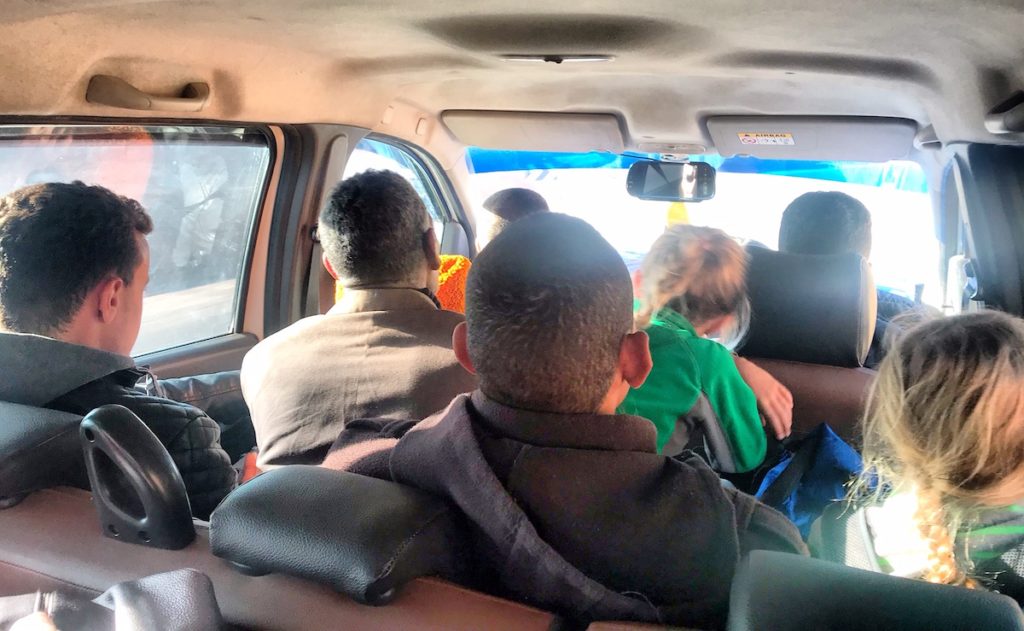
In small places, you can find collective taxis. You pay for your own places in a big taxi which will go on some fixed popular route. The taxi driver will wait until the taxi is full before going. In Ait Ben Haddou we found ourselves in a taxi with 7 others
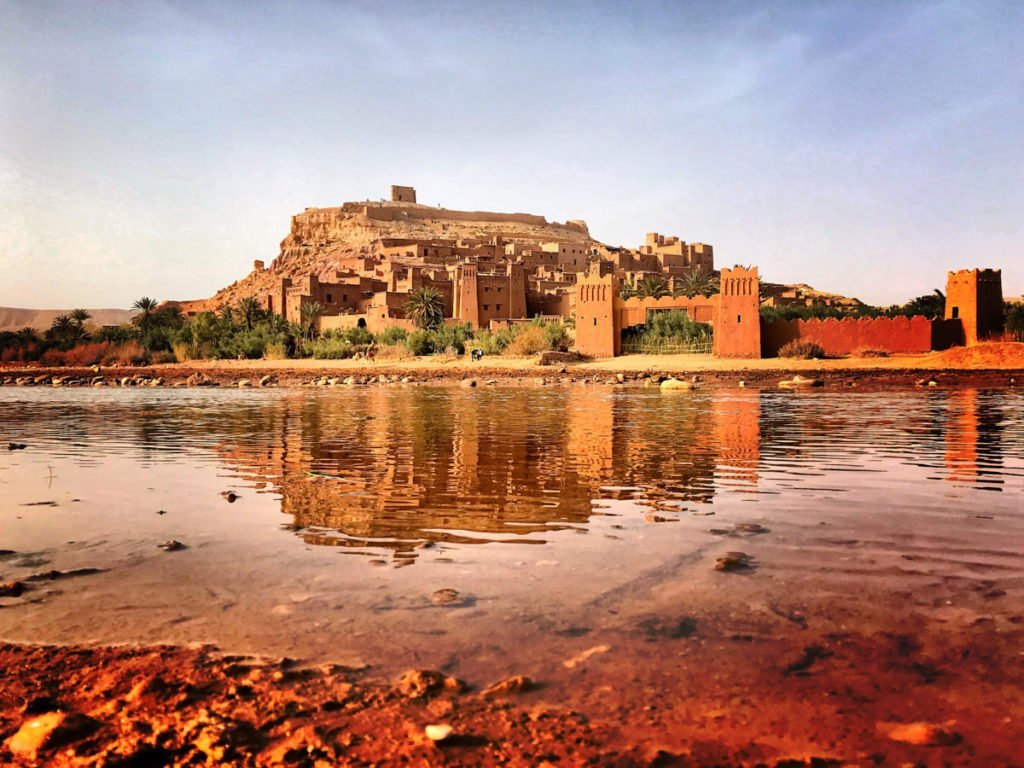
Read guide to Ait Ben Haddou and Ouarzazate
Don’t count on any driver having kids car seats. We travel with mifold grab and go. Read about foldable car seats in here
Travelling by plane in Morocco
When we were in Zagora (very much inland close to Sahara Desert) we decided to travel to Casablanca by air instead of enduring a ten-hour bus ride. So whenever you are planning a long-distance trip in Morocco check Royal Air Maroc they have good prices for local flight.
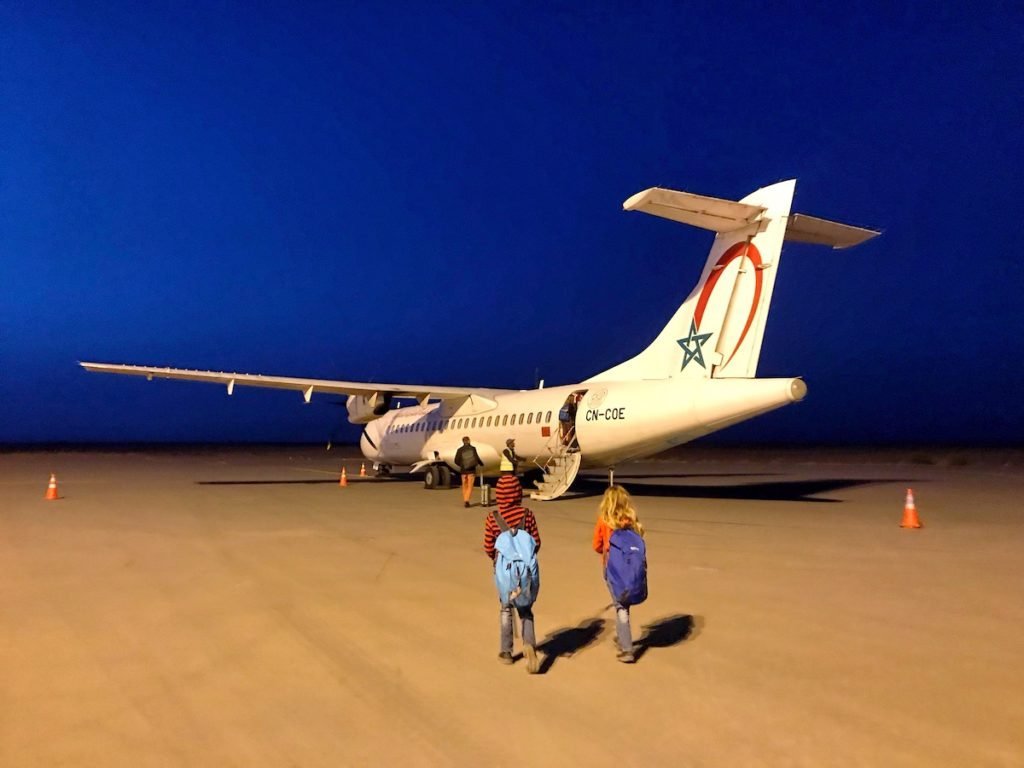
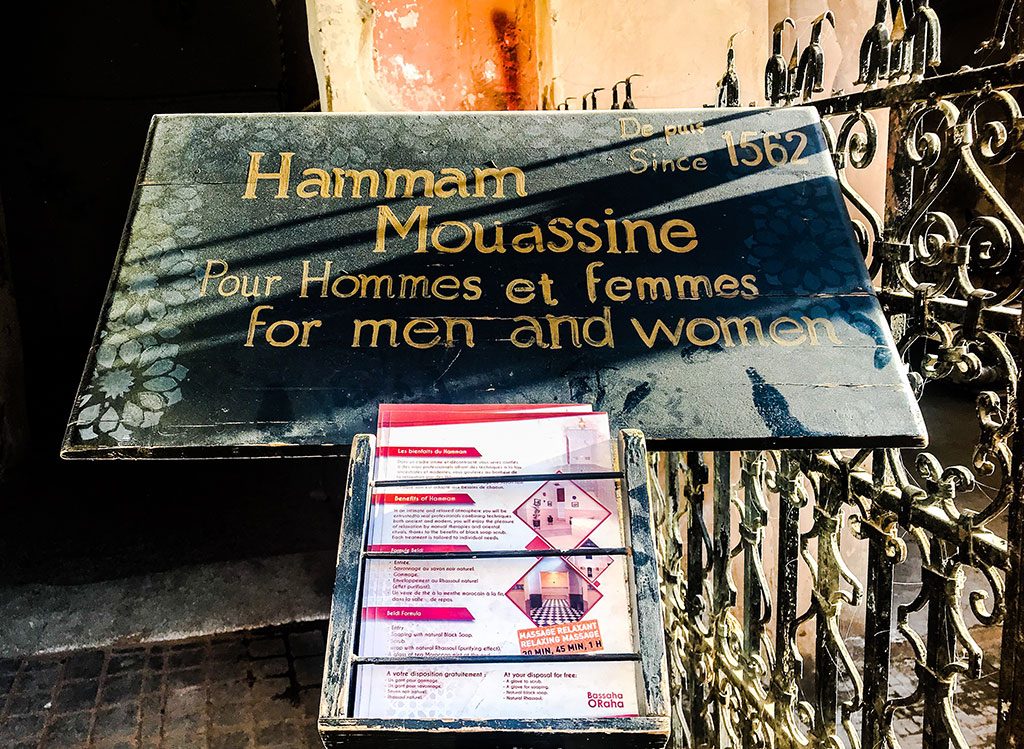
Traditional Hammam steam bath. Moroccan Hammam – Read More..
Travelling by train in Morocco
Train in Morocco are probably the easiest and most comfortable way to travel. We travel from Casablanca airport to Rabat. Starting from buying tickets to changing the trains all was very easy and convenient. If you travel shorter distance, 2nd class is perfectly comfortable to travel. Though, I wouldn’t say carriage was clean.
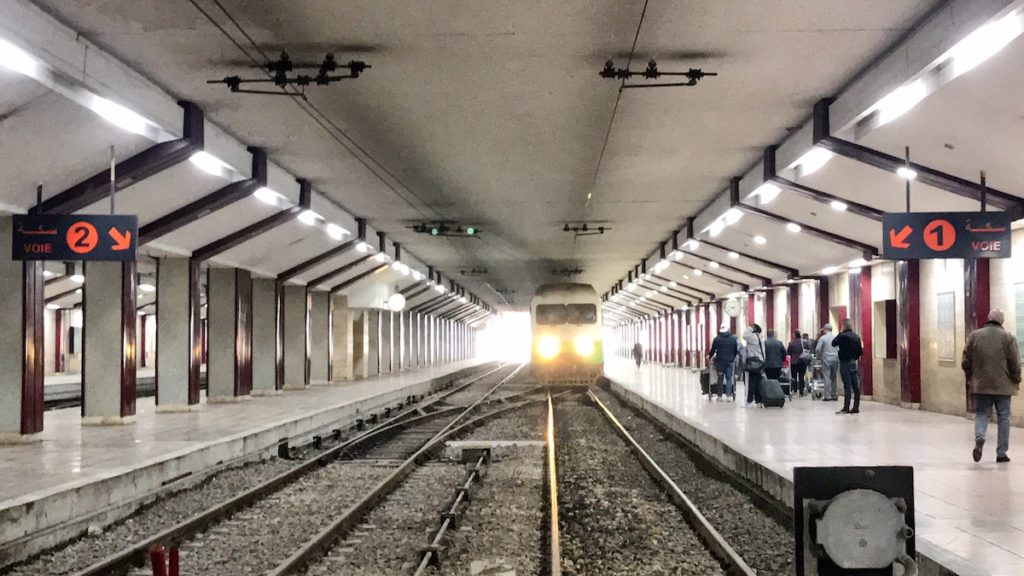
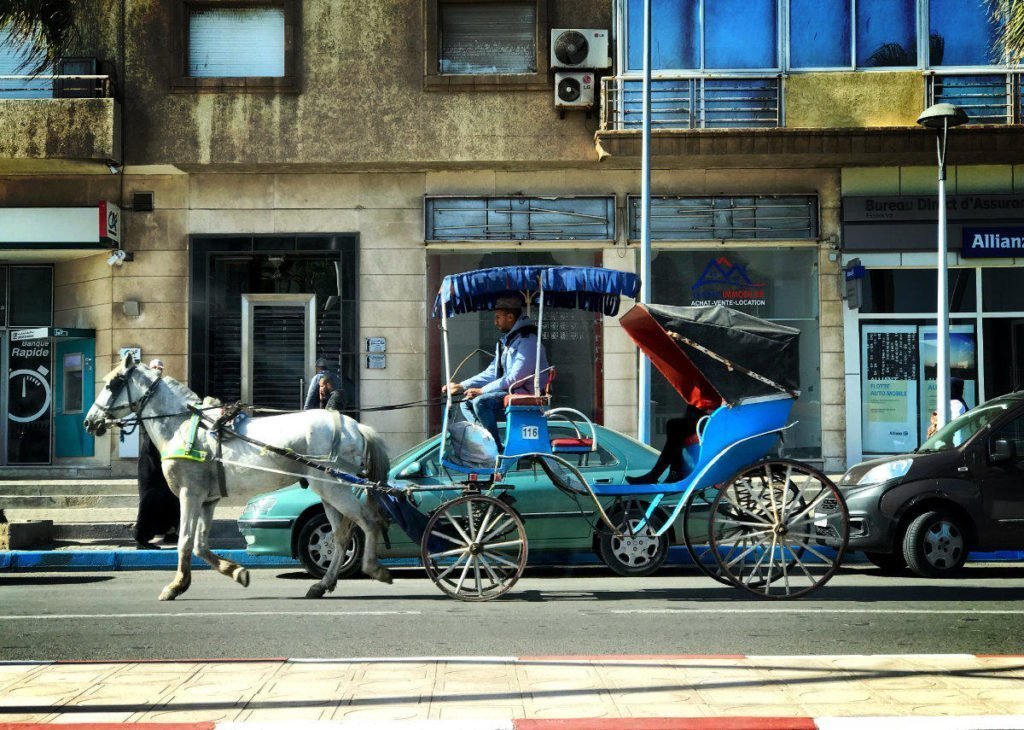
Weather in Morocco

We have been in Morocco in winter and it is not as warm as you might expect it to be. I heard the saying that Morocco is a cold country with a hot sun. It very much felt like that for us in here. Outside in the sun, we could be in the swimming costume, in the shade or wind three layers of clothes didn’t seem to be enough. The coast seems to be cooler than inland which is unusual. My advice – bring layers of clothes.
Food and Drink in Morocco
First a note about public health – do take a look at your own government’s recommendations before you travel. For the UK this is here:
Don’t drink tap water anywhere in Morocco. It can be contaminated with Hepatitis A. We were warned by all our landlords to avoid it.
Logically this means you also shouldn’t eat salads, drink fruit juices or take any other food which touches plates and cups washed in fresh water. The NHS site points out that all risks are greater for some than for others and we seem to have strong guts. We lived for nearly a year in India, ate from street vendors regularly and only had one day of delhi-belly between us the whole time, however we have been ill in Morocco, and ít wasn’t after eating salad or drinking water – so perhaps it came from cutlery or crockery – or maybe it was a mixture of oily diet and long bus journeys.
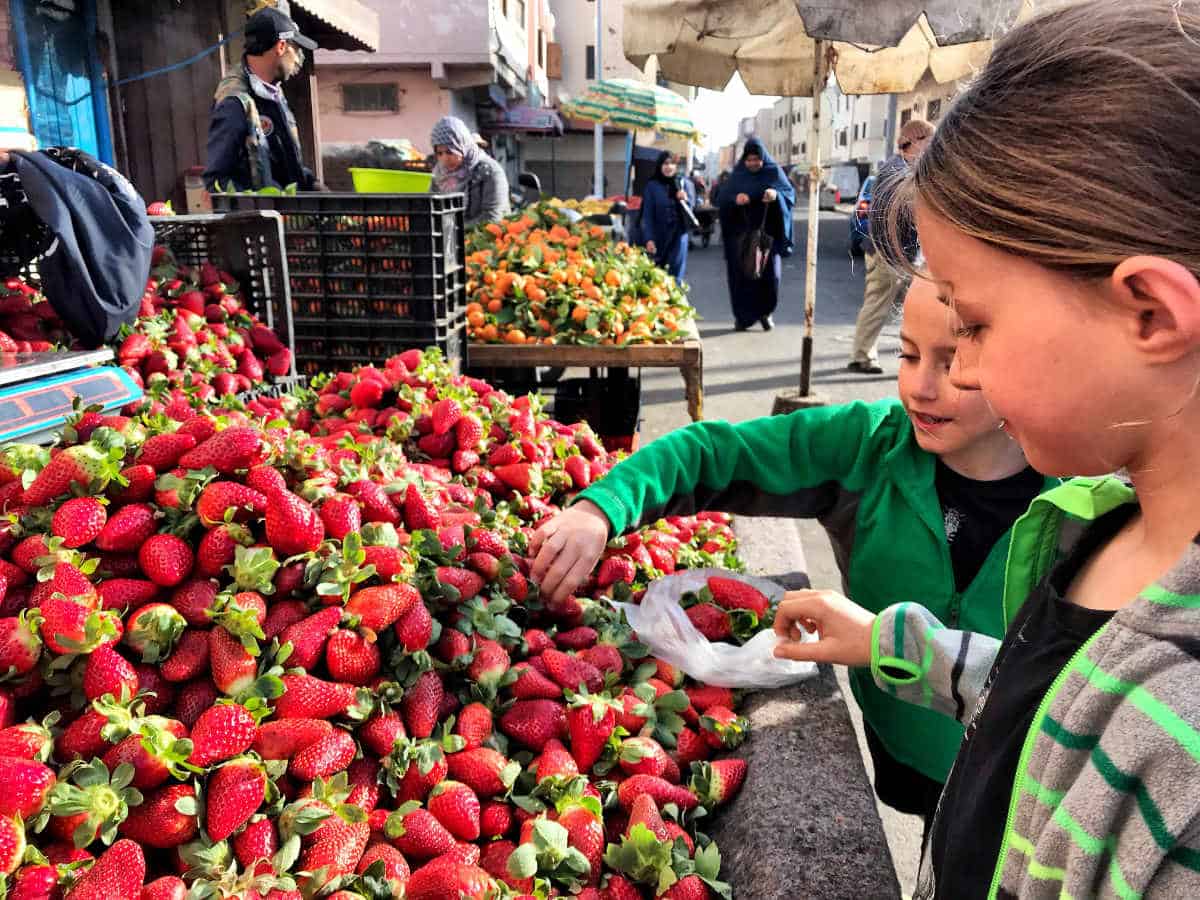
Street markets are the best place to get food. Fruits – especially tangerines and oranges are very cheap 3 Dhs a kilo, 5 Dhs for 2, but strawberries at 15 Dhs a kilo are also irresistible.
We take advantage of all cheap fruit juices – orange juice from the street vendor will be pressed in front of you and will cost 4 or 5 Dhs (50 Cents).
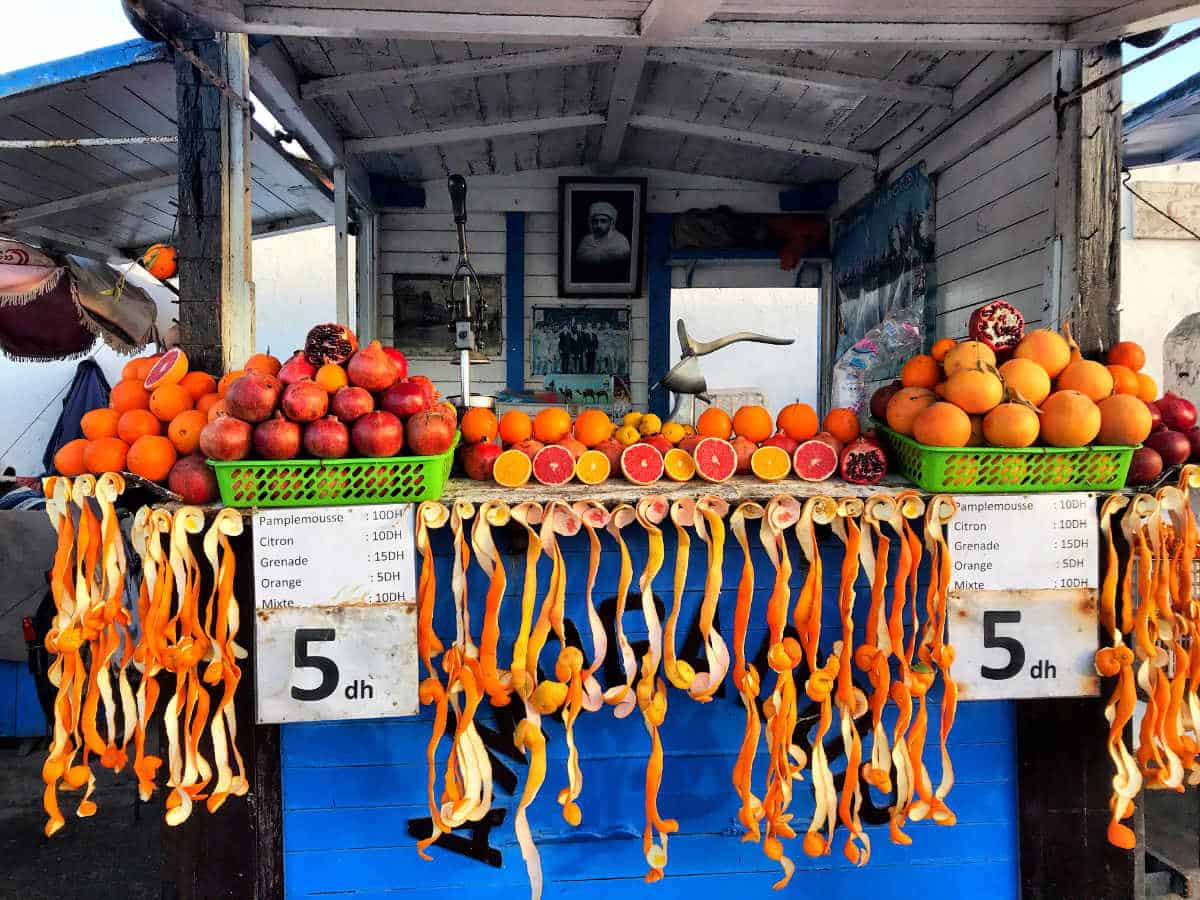
Two standard and delicious meals in Morocco are Tagines and Tanjias. Tagines are the conical-lidded shallow dishes you see everywhere. They are used for cooking and serving, and they contain meat (or fish) and veg, slow cooked with spices, olives and lemons. Tanjia may come in the same shaped dish or a tall earthenware pot and they contain slow-cooked meat and juices but no veg.
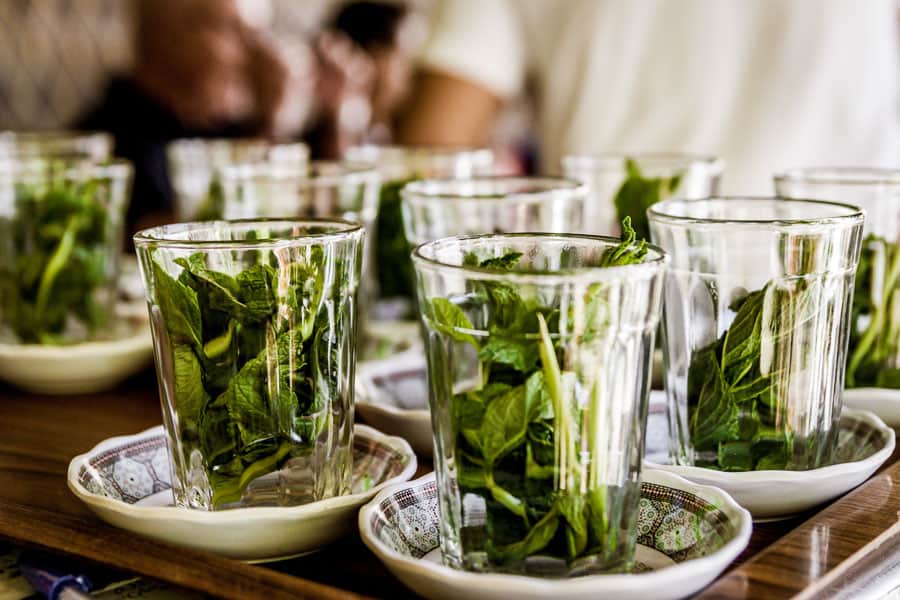
We eat salads all the time and have had no bad effects. Consider your own disposition before copying us.
Don’t expect to find gluten-free and dairy-free alternatives for bread, pasta, butter or cheese here. If you need this stuff (as we do) it’s not a problem if you are cooking for yourself. Buy fresh food from the market. If you are eating out – Tagines and Tanjias are free of both – they are also served in the same pot they are cooked in so they are effectively sterilised.
Photography in Morocco
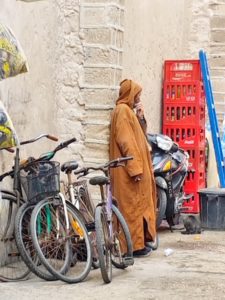
People in Morocco, as probably everywhere else, don’t appreciate having a stranger’s lens pushed in their faces. In Marrakech which seems to be more money-oriented expect that if you will take a photo of someone, he will ask you to pay for it, and more than you expect. We were advised that snake charmers will expect 100-200 Dhs, So as everywhere in the world, be polite and ask if you can take the photo.
Drones in Morocco
Morocco is one of the few countries where drones are not allowed. If you try to bring one in your luggage it will be confiscated at the airport. Apparently, they should return it to you on departure, but why risk it? I didn’t. Our bags were x-rayed coming into the country and my photo equipment bag was thoroughly checked.
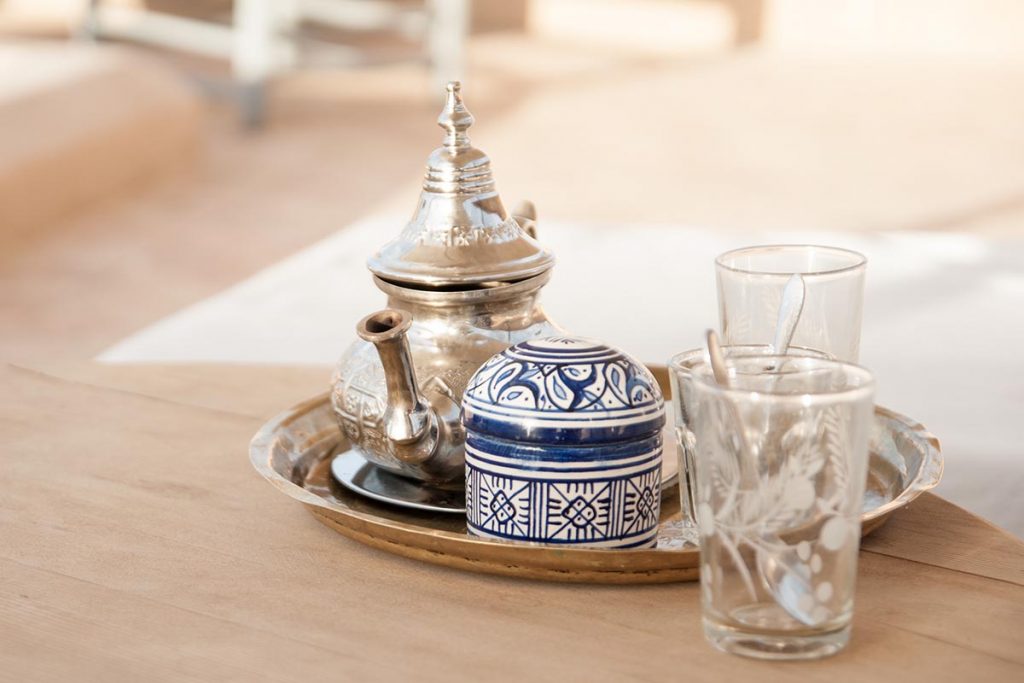
Morocco hollywood, Zagora, Djellebah.. Some facts about Morrocco – Read more.
Visiting Sites in Morocco
Prices I have found on other blogs about entry fees have always been much too low. Everywhere now seems to have two prices, one for nationals and one for foreigners. Most places seem to charge about 70 Dhs for foreign adults and either free or 30 Dhs for children. This came as a bit of a surprise when I was expecting entry fees to be about 10 Dhs from my research.
Places to visit in Morocco
- Marrakech
- Essaouira
- Fez
- Ait Ben Haddou
- Chefchauen
- casablanca
- Zagora
- Atlas Mountains
- Sahara Desert
Bringing Souvenirs from Morocco
Morocco is an excellent place to buy souvenirs. The whole buying process is an experience on its own. Do read our guide so you will learn where you can best deal and how much you should pay for Moroccan souvenirs
Buying Spices in Morocco
Last tip – for buying Moroccan spices. If you want to buy spices, you may buy them on the market (as we did) and learn a lot about how to use them or… You may go to Carrefour and discover that you can buy them there 10 times cheaper, but we live and learn – c’est la vie!
Additional read
Morocco travel advice – Pin it for later !!!
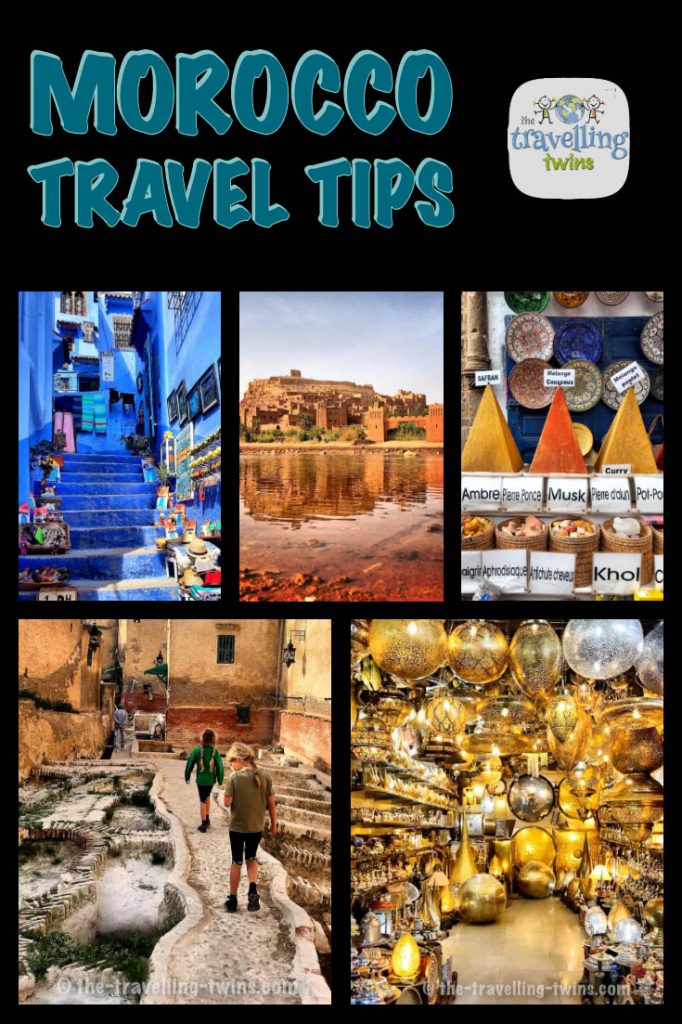
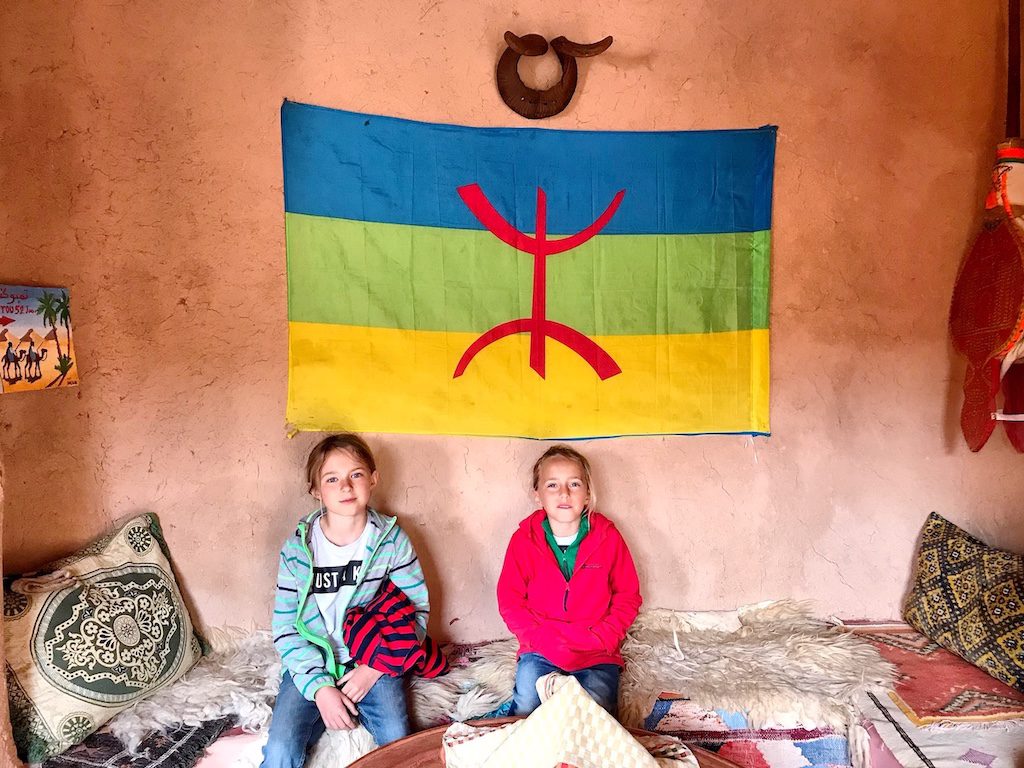
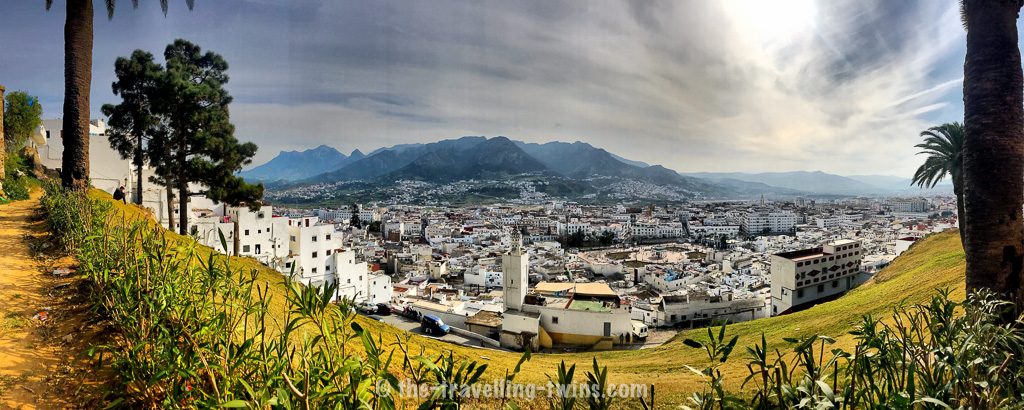
Great tips and sound advice. Cheers.
Thank you, I’m happy you find them useful
Great post on Morocco! I desperately want to travel here but need to convince my husband! I will show him this post!! Thanks for the tips. Saving for later!
Morocco is a very colorful and hectic place, but its safe for sure.
Have always wanted to visit Morocco but feel hesitant safety wise! This blog has so much info, and I’m sure it will help those planning on a trip here!
I would LOVE to take my babies to Morocco! It is on the bucket list, for sure. Thanks for the great tips!
So much great info! Especially discussing safety of children. Even as mine are getting older, I still worry if we get separated.
I don’t even want to think what would happen here if we would get separated, but we still need to warn them about it.
This loooks like an incredible place – this article is so full of helpful info thank you!! Not sure if we will ever make it here but I would love to visit!
Its an interesting place to visit, so maybe one day you will make to here 😉
Such great tips and I wish I had read them before we went last year- we were completely unprepared!
Love all the great information! We are dying to visit Morocco!
It’s a great place, but my main advice would be to plan your trip so it will good have place to rest, as this place is intense
Loves this many thanks, visiting in May to two of the places mentioned here now to just source accommodation and car hire!
What an awesome and extensive guide, so much information! Totally pinning this for later, looks like an unforgettable trip!